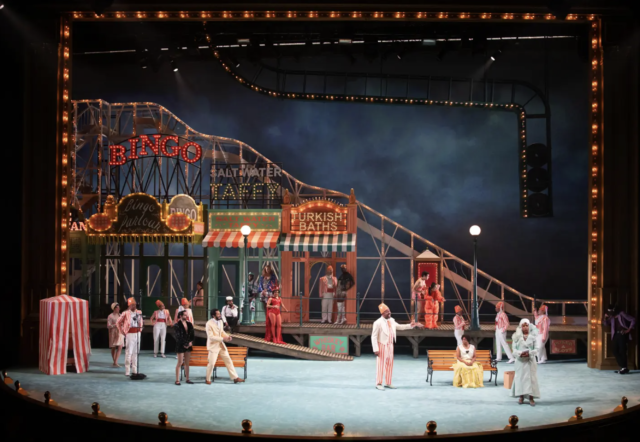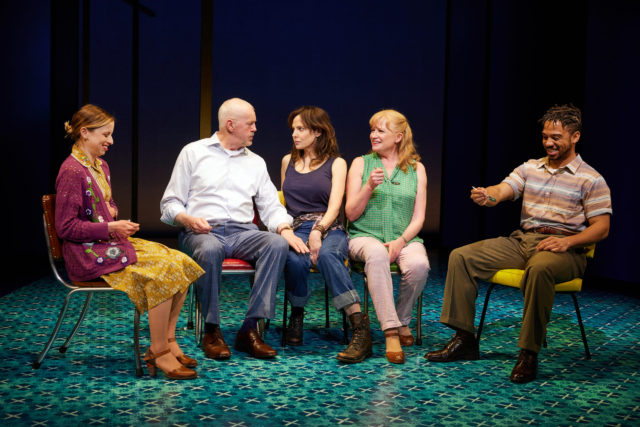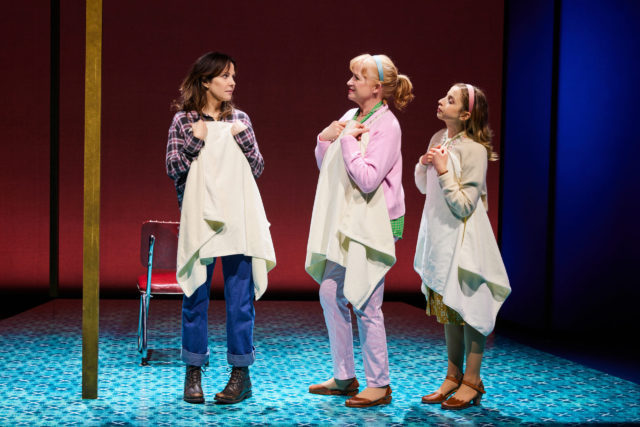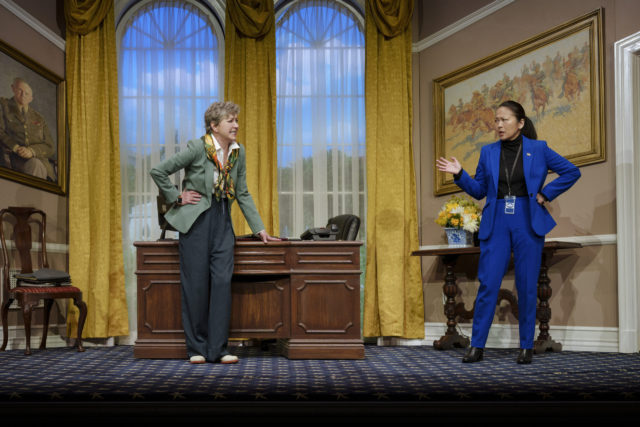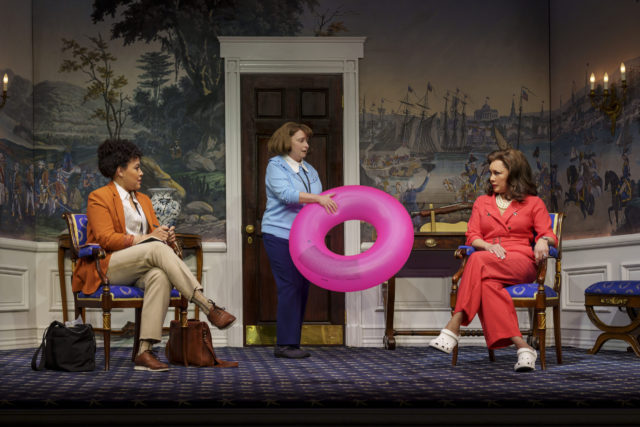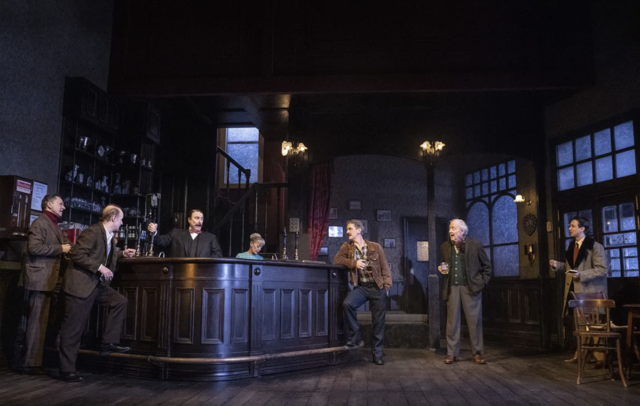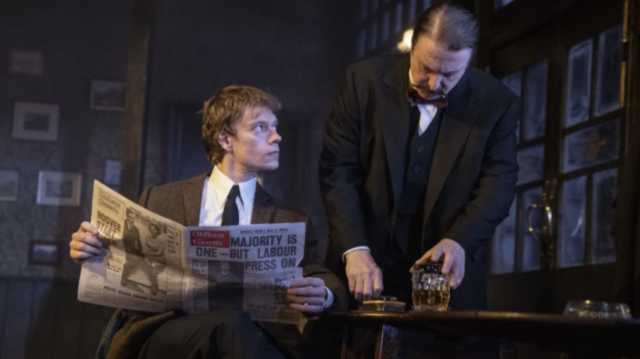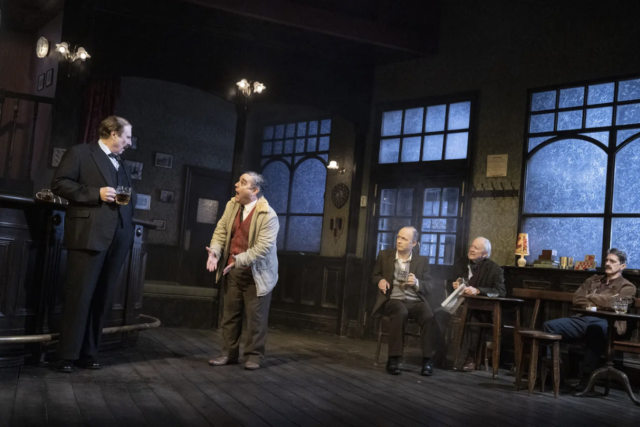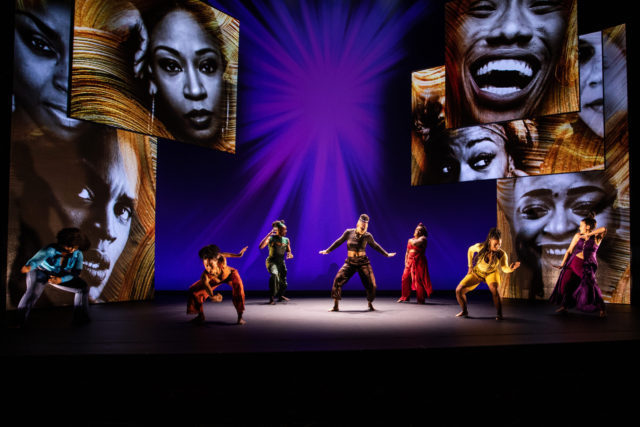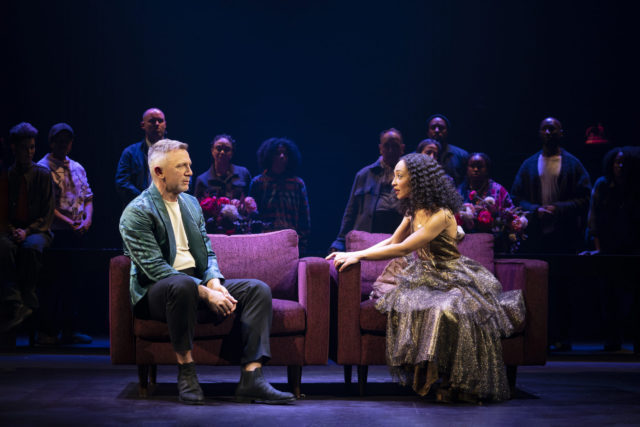
Assalone (Jeff Still), Superba (playwright Tracy Letts), and Breeding (Cliff Chamberlain) form a decidedly white triumvirate in The Minutes (photo by Jeremy Daniel)
THE MINUTES
Studio 54
254 West 54th St. between Eighth & Ninth Aves.
Tuesday – Sunday through July 24, $39-$249
212-719-1300
theminutesbroadway.com
Tracy Letts skewers tribal politics and political correctness in the cancel culture age in his acerbic black comedy The Minutes, running on Broadway at Studio 54 through July 24. Letts, who won the Pulitzer Prize for August Osage Country, which deals with a dysfunctional family and a missing patriarch in Oklahoma, now turns his razor-sharp pencil — which the character he portrays, Mayor Superba, actually sharpens during The Minutes — on the small Midwest town of Big Cherry, where truth appears to be a Kafka-like concept.
The ninety-minute play takes place at a city council meeting, where the members are arranged in a semicircle; they are like a dysfunctional family with Superba at the head of the table. Mr. Oldfield (a riotous Austin Pendleton) is the curmudgeony, doddering grandfather, Ms. Innes (Blair Brown) is the Dianne Feinstein–like matronly grandmother, Mr. Superba is the strict father, Mr. Matz (Sally Murphy) is the disheveled, ditzy sister, Mr. Breeding (Cliff Chamberlain) is the snooty, privilege-flaunting younger brother, Mr. Assalone (Jeff Still) is the unscrupulous older brother, Mr. Hanratty (Danny McCarthy) is the good-natured but misguided uncle, Mr. Blake (K. Todd Freeman) is the oddball uncle unable to make decisions for himself, and administrative assistant Ms. Johnson (Jessie Mueller) is the niece trying to keep the family together.
The newest councilmember, the fresh-faced Mr. Peel (Noah Reid), has returned to the chambers after having attended his mother’s funeral; he arrives like it’s the first day of school, bright-eyed and bushy-tailed. But he is taken aback when he sees that Mr. Carp’s (Ian Barford) space at the table is empty and no one will tell him why. “I’m sure you’ll learn what you need to know,” Johnson tells him before things get underway.
Hanratty is looking for support for his accessible public fountain restoration project, which will be highlighted by a bronze statue of a local war hero. Blake is pushing his Lincoln Smackdown idea. Innes wants to read into the record a statement about the Big Cherry Heritage Festival.
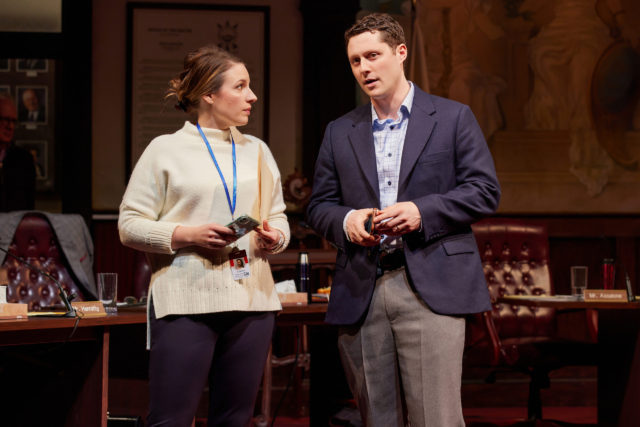
Peel (Noah Reid) shares his issues with Johnson (Jessie Mueller) in sharp Tracy Letts satire (photo by Jeremy Daniel)
Peel is intent on finding out why Carp is no longer part of the council, but no one is sharing any details. When Superba skips over the reading of the minutes from the prior week, Peel pushes back, determined that the rules of order be followed and the information be made available. It’s clear that something bad happened that the others have decided to bury, so he attempts to rectify it. However, getting to the bottom of things is not going to be easy, but as secrets are revealed, bit by bit, a clearer picture of what went on the prior week starts coming into focus, a stark portrait of where America is today in 2022, where facts are just another opinion.
Letts, who has written such previously plays as Mary Page Marlowe and Man from Nebraska and starred on Broadway in such classics as All My Sons and Who’s Afraid of Virginia Woolf?, tweaked The Minutes, which debuted at Steppenwolf in 2017, during the pandemic; the play had just begun previews at the Cort in March 2020 when Broadway closed down.
It now feels up to the moment as the play turns toward such controversies as whitewashing history, the validity of monuments, colonialism, and cultural appropriation. In addition, the show replaced the original Peel, scandal-ridden Armie Hammer, with Reid, making his splendid Broadway debut as an idealist who believes that he and the council can really make a difference. (Ha!)
Letts nails the constant frustration of government as the council goes about its activities, which are filled with personal and financial interest and a complete lack of care for the public good. The often surreal conversations reveal the utter hypocrisy and endless nonsense underlying it all as the characters pretend to discuss the underrepresented and argue over nomenclature. Peel regularly corrects the others for strange mispronunciations; “I’m not sure you’re saying that right,” he tells several of the others, but they ignore him as he learns that both what they say and how they say it just doesn’t matter.
When Breeding suggests that it is not the right time for her to read her statement, Innes declines to wait. “It is a statement I’d like to read to the council. About the council,” she says. Breeding responds, “I wonder if it might be more appropriate to read in a meeting of the Council Rules Committee.” Everyone looks at Matz, who has a problematic attention span. “Ms. Matz?” Superba says. “Yes?” she answers. Superba: “You’re chairperson of the Council Rules Committee.” Matz: “Yes, I am.” Superba: “Is there a committee meeting scheduled in the near future?” Matz: “That would depend on your definition of future.” Superba: “‘Events that will happen in the time to come.’” Matz: “Then yes, of course.”

Peel (Noah Reid) finds out more than he ever wanted to know about local politics in The Minutes (photo by Jeremy Daniel)
Another hysterical exchange, which would make Beckett proud, occurs between Superba and Oldfield:
Superba: Before we begin, any announcements?
Oldfield: I have an announcement.
Superba: All right, go ahead.
Oldfield: Well, let’s talk about parking.
Superba: Is that an announcement?
Oldfield: I’m announcing that I’d like to talk about parking.
Superba: George, that’s not an announcement.
Oldfield: I believe it is.
Superba: Announcing what you’d like to talk about is not an announcement, any more than announcing that you’re going to the bathroom.
Oldfield: Well, that’s embarrassing. I didn’t think when I came in here tonight I would have to hear the word “bathroom.”
Superba: That might not be the last time tonight you hear that word.
Oldfield: Let me go on the record as saying, “I hope it is.”
Superba: Are there any other announcements?
Oldfield: I would like to announce that there is an unclaimed empty parking space available to this council.
Superba: What are you saying, that you want the parking space?
Oldfield: No, I’m not saying that. Even though I most definitely want the parking space. . . . .
Superba: I still don’t consider this even remotely in the realm of “announcements.”
Over the course of the last few years, with the proliferation of smartphone cameras and the need to record everything, Americans have been privy more than ever to the circuslike atmosphere of town meetings, statehouse discussions, and congressional debates. We see elected representatives butcher the English language, deliver grandstand speeches chock-full of inaccuracies, and misinterpret the law every day. In The Minutes, Letts and director Anna D. Shapiro (Straight White Men This Is Our Youth), who helmed August Osage Country, present the Big Cherry council meeting as if we’re watching C-SPAN, with David Zinn capturing the essence of a council meeting chamber, complete with ridiculous local art, framed proclamations and photographs of former members, and a large U.S. flag. (The costumes are by Ana Kuzmanić, with lighting by Brian MacDevitt and sound and original music by André Pluess.)
In his superbly understated Broadway debut, Reid, the Canadian singer and actor best known for his role as Patrick Brewer on Schitt’s Creek, is a stand-in for the audience, as if he’s our elected representative (voted in by our ticket purchases?), aghast at what he’s seeing; democracy is unraveling right before his, and our, eyes, and no one else in the room seems to care.
Every word matters to Peel, as it does to Letts the playwright, who leaves us with a bizarre finale that is likely to leave your mouth agape, at a loss for words. The title applies not only to the omitted meeting records but also to the short time we have left to fix the mess we’ve made of the great American experiment.

